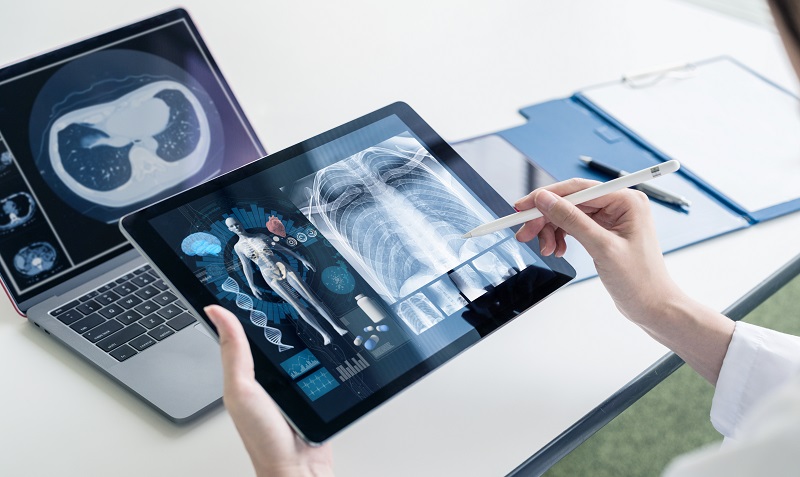In 2022, the UK Government put forward a plan for digitally-focused health and social care and hopes that, by 2025, all organisations in the sector will be leveraging digital solutions and technologies to improve the quality of care delivered.
The strategy sets out an intention for providers to plan, design, and deliver services in a personalised way while helping to save time for staff.
However, many institutions are battling the lack of digital skills in the industry to effectively deploy these digital technologies, such as automation and bots.
In fact, research by Virgin Media O2 Business and Censuswide in 2022 discovered that 55% of both private and public-sector employees in the UK report that their employer is experiencing a digital skills shortage.
And it is a situation that is worsening in the NHS, with vacancies across all sectors rising from 2020 to reach 133,446 in September 2022, totalling a vacancy rate of 9.7%.
But, with insufficient human resource to drive technological change, how do institutions push their digital transformation roadmaps forward?
The potential delivered by automation
Carefully-chosen technologies can transform the actions taking place in health and social care buildings.
Layers of automation can work to change healthcare processes by removing the mundane tasks from humans.
Take the example of the finance department that needs to deal with hundreds of thousands of invoices a year.
Robotic process automation (RPA) can automatically process invoices for payments to suppliers.
And Intelligent document processing (IDP) can also be integrated to extract relevant key information from credit notes and other documents for RPA to input the data for accurate payments.
With RPA as the baseline, natural language processing (NLP) can analyse and understand the context of an incoming email to a healthcare institution helpdesk and then decide which department it should be sent on to, saving admin time.
The key is relying on the expertise of a specialist partner to help integrate a small-scale automation to present the benefits to employees
Additionally, machine learning (ML) capabilities can be utilised in other areas of healthcare by making predictions of illnesses or diseases in patients.
For example, it can analyse a wide set of photos to check whether a specific patient has melanoma, with comparison against an instance of a cancerous mole and benign mole to decipher a diagnosis.
Relevant information can then be sent to a GP for further action or an RPA solution can even automatically book in an appointment for a patient to discuss treatment.
However, these potential innovations will be inaccessible to institutions lacking the digital skills to bring in RPA, IDP, NLP, and ML technologies.
The key is relying on the expertise of a specialist partner to help integrate a small-scale automation to present the benefits to employees.
Many NHS organisations lack the digital skills and knowledge to fully embrance and make the most of technologies such as AI
Democratisation of development
A study by Coventry University in 2021 discovered that many workers across all levels of the NHS lack basic digital skills and are fearful of adopting new technologies due to an inherent fear of change.
External experts can work side-by-side with hesitant employees to demonstrate how automation can transform their working day.
For workers eager to learn more, this training can build the digital skills of staff to implement their own automated solutions to benefit the organisation further, enabling a democratisation of bot development.
Workers across all levels of the NHS lack basic digital skills and are fearful of adopting new technologies due to an inherent fear of change
Furthermore, unlike many software applications, RPA is accessible to humans without a specialised knowledge of coding.
This is in contrast to traditional workflow automations, which will typically require an experienced software engineer to devise detailed code that drives automated actions.
Software would then need to connect to application programming interfaces (APIs) written in a specific software language.
RPA systems are much more intuitive by being able to record a user’s actions as they complete a task and replicate this process without any human effort.
However, for automation innovation to continue beyond this point, it is vital to keep the pipeline of talent running through the institution to enable more-complex projects.
Failing to lean on the expertise of specialist advice will leave organisations struggling to gather the right skills and resources to implement game-changing automated technologies, particularly among stretched NHS trusts
Many NHS trusts are wisely taking the step of employing university students with an IT background during their placement year to develop their skills for when they graduate and return to the workforce.
Digital education
With governmental pressure increasing, healthcare institutions need to analyse how every service is planned and designed before delivery to patients to gain a foothold in digital innovations.
Failing to lean on the expertise of specialist advice will leave organisations struggling to gather the right skills and resources to implement game-changing automated technologies, particularly among stretched NHS trusts.
With this support in place, healthcare institutions can take a first step in implementing RPA to automate repetitive tasks and encourage employees to build their digital skills.
And this foundation can serve as the pathway to IDP, NLP, and ML integrations to further enhance efficiencies and support staff.




